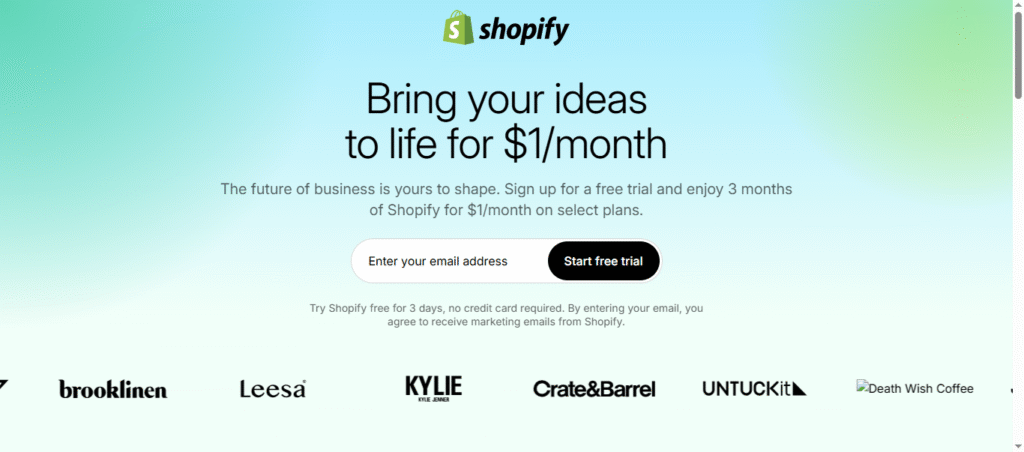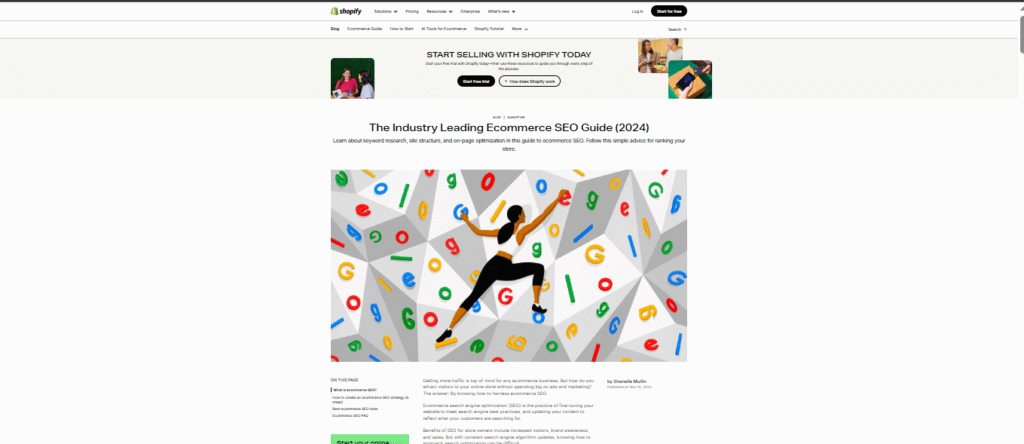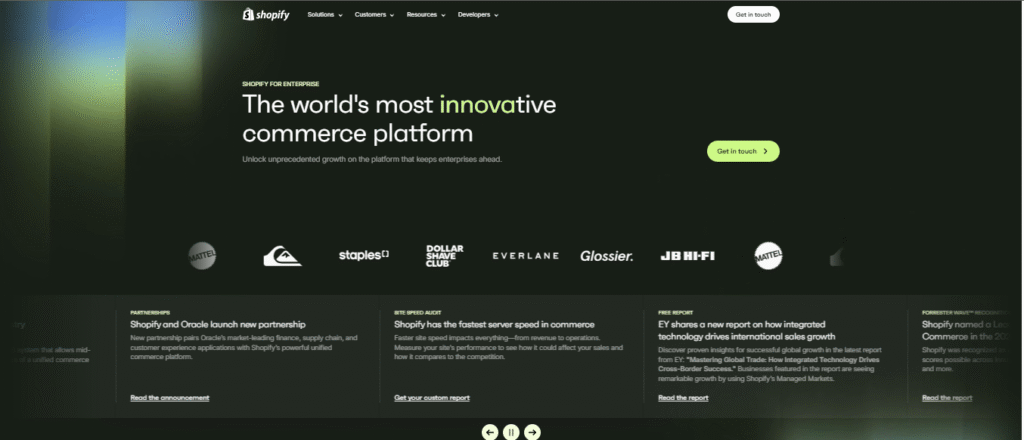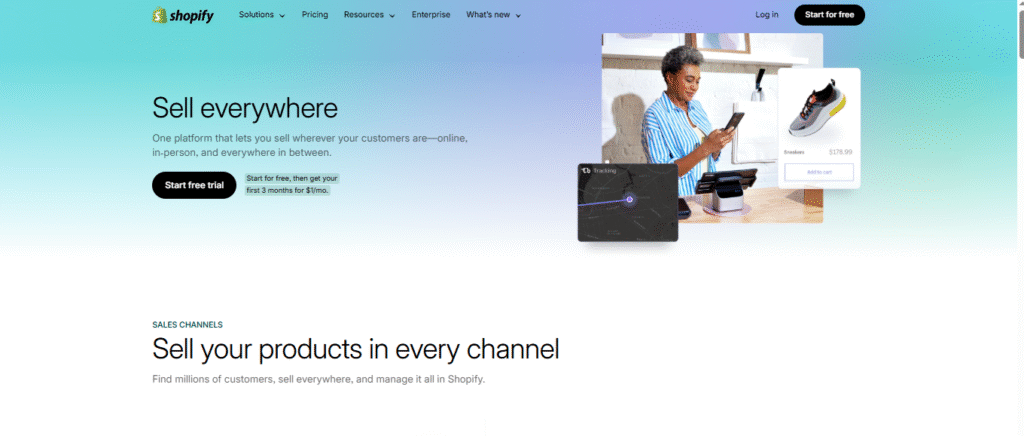Shopify is one of the top ecommerce platforms where sellers can build their own online stores. Users of Shopify can sell products online and even in person without any technical know-how due to the ease and flexibility that the platform offers. Shopify makes sales possible on other platforms like Instagram and Amazon as well as TikTok. It also has an interface that is incredibly easy to use and contains powerful features alongside tools that enhance the selling experience.
shopify
Shopify also offers a simple setup process that makes it easy for you to get started – from choosing a theme to setting up payment gateways and shipping options. This makes it easy for beginners to get their store up and running without hiring a developer.
Navigation is intuitive, and the platform is designed to minimize the learning curve. Even if you’re new to ecommerce, you can go from signup to selling in just a few hours. And if you do get stuck, Shopify provides helpful tooltips and direct links to documentation throughout the admin panel.

Design & Themes
Shopify offers many different themes and designs that you can choose from.
Each theme is fully customizable through Shopify’s drag-and-drop editor. You can adjust colors, fonts, layouts, and content blocks to match your brand’s identity. No design experience is needed—Shopify gives you full creative control with a user-friendly interface.
Whether you’re running a fashion boutique, electronics shop, or subscription box service, Shopify has themes tailored for various industries. Each theme is also designed with performance in mind, ensuring fast load times and responsive designs that improve user experience and SEO.
For those who want more customization, Shopify allows access to the theme’s code (HTML, CSS, Liquid), giving developers the flexibility to build completely unique storefronts.
Pricing & Plans
Shopify offers flexible pricing plans to suit businesses of all sizes, from new startups to growing enterprises. Each plan includes essential ecommerce features like unlimited products, abandoned cart recovery, discount codes, and access to the Shopify App Store.
Shopify’s Main Pricing Tiers:
- Basic Shopify ($39/month)
Ideal for new businesses. Includes basic reporting, 2 staff accounts, and essential tools to launch a store. - Shopify ($105/month)
Best for growing businesses. Adds professional reports, 5 staff accounts, and better shipping discounts. - Advanced Shopify ($399/month)
Designed for scaling operations. Includes advanced reporting, 15 staff accounts, and third-party shipping rates.
All plans come with a 3-day free trial, allowing users to explore the platform before committing. Shopify also sometimes offers $1/month deals for the first three months on Basic plans—great for those just getting started.
In addition to these main plans, there’s Shopify Plus for enterprise-level businesses, and Shopify Starter ($5/month) for selling products through social media or messaging apps without a full online store.
Additional Costs to Consider:
- Transaction Fees: If you don’t use Shopify Payments, transaction fees apply (up to 2%).
- Apps & Themes: Premium apps and themes may add to your monthly costs, depending on your store’s needs.
Features & Tools
Shopify is more than just a website builder—it’s a full-featured ecommerce platform designed to help businesses sell, manage, and grow efficiently. From product management to analytics, Shopify offers a powerful suite of built-in tools that support every stage of an online business.
Key Built-In Features:
- Product Management
Easily add, organize, and edit unlimited products. Shopify supports product variations, inventory tracking, and bulk editing, making it ideal for stores of all sizes. - Order & Customer Management
Track orders, manage refunds, and view customer profiles in a clean, intuitive dashboard. Automated email updates keep customers informed every step of the way. - Shopify POS (Point of Sale)
Sell in physical locations with Shopify’s integrated POS system. Syncs inventory and sales across online and offline channels in real time. - Abandoned Cart Recovery
Automatically send emails to customers who didn’t complete their purchase—an essential tool for increasing revenue. - Analytics & Reporting
Access detailed sales reports, traffic insights, and customer behavior data. Higher-tier plans unlock advanced reporting options. - Mobile App
Manage your store on the go with the Shopify mobile app—track sales, manage inventory, and communicate with customers from your phone. - Multichannel Selling
Sell on Facebook, Instagram, Amazon, TikTok, and more—all from your Shopify dashboard.
Extend Functionality with Apps
Shopify’s App Store features thousands of apps to enhance your store’s capabilities. Whether you need marketing automation, dropshipping tools, or customer reviews, there’s likely an app for it.
Ecommerce & Sales Features
Shopify is built specifically for ecommerce, making it one of the most powerful platforms for selling products online. Whether you’re selling physical goods, digital downloads, or subscriptions, Shopify provides everything you need to manage sales efficiently and scale your business.
Product Management
Shopify allows you to list unlimited products with detailed descriptions, high-quality images, SKUs, inventory tracking, and product variants like size, color, or material. You can also create product collections for easy navigation and promotions.
Checkout Experience
The checkout process on Shopify is fast, secure, and mobile-optimized. You can customize the checkout page to match your brand and offer guest checkout to speed up conversions. Shopify also supports discount codes, gift cards, and automatic tax calculations to simplify selling.
Multi-Channel Selling
Shopify makes it easy to expand your reach by selling across multiple platforms. You can integrate your store with:
- Facebook & Instagram Shops
- Amazon & eBay
- Google Shopping
- TikTok for Business
All sales and inventory are synced in real time, so you never oversell or miss an order.
Digital & Subscription Products
With the help of apps, Shopify supports digital downloads, subscriptions, and memberships. This makes it flexible enough for creators, educators, and service-based businesses.
Built-in Sales Tools
- Upsells & Cross-sells: Boost your average order value with product recommendations and bundles.
- Abandoned Cart Recovery: Automatically remind customers to complete their purchases.
- Email Marketing: Send promotional emails directly from your Shopify dashboard or integrate with tools like Klaviyo or Mailchimp.
SEO & Marketing Tools
Shopify gives store owners a solid foundation to attract, engage, and retain customers through built-in SEO and marketing features. Whether you’re just starting out or looking to scale, Shopify includes the essential tools to help you promote your business and improve visibility in search engines.
Built-in SEO Features
Shopify comes with basic SEO tools that help your site rank on Google and other search engines. You can easily:
- Edit meta titles and descriptions
- Customize URLs and image alt text
- Automatically generate sitemap.xml and robots.txt files
- Use 301 redirects to avoid broken links
Shopify’s themes are also mobile-responsive and built with clean code, which improves site speed and helps with SEO rankings.
Blogging Capabilities
Content marketing is key for organic traffic. Shopify includes a built-in blogging tool so you can publish articles, how-tos, and updates. It’s a simple but effective way to drive traffic and improve keyword relevance over time.
Marketing Automation Tools
Shopify offers several marketing tools within the dashboard, including:
- Email marketing – Create and send email campaigns directly or via integrations like Klaviyo or Mailchimp.
- Campaign creation – Run promotions and set up automated discount codes.
- Audience segmentation – Target specific customer groups for personalized messaging.
Social Media & Ads Integration
You can connect your Shopify store to Facebook, Instagram, Google, and TikTok to run paid ads and sell directly through social media channels. Shopify tracks performance and conversions so you can optimize your ad spend.
Shopify App Store
For more advanced marketing features, the Shopify App Store offers tools for:
- SEO optimization
- Affiliate marketing
- Retargeting ads
- Loyalty programs
- Reviews and referrals

Scalability & Performance
One of the biggest advantages of using Shopify is its ability to scale with your business. Whether you’re just starting out or managing thousands of daily transactions, Shopify provides the tools and infrastructure needed to support long-term growth.
Built for Businesses of All Sizes
Shopify is designed to work for both small businesses and large enterprises. You can start with a basic plan and upgrade as your business grows—without switching platforms. From managing a handful of orders a week to processing thousands a day, Shopify keeps up with demand.
For high-volume merchants, Shopify Plus offers enterprise-level features, including advanced automation, dedicated support, and custom checkout capabilities.
Reliable Hosting & Speed
All Shopify stores are hosted on a high-performance infrastructure with 99.99% uptime, ensuring your store stays online—even during traffic spikes like Black Friday. Shopify uses a global content delivery network (CDN), which helps pages load quickly regardless of where your customers are located.
Faster load times mean a better user experience, lower bounce rates, and higher conversion rates—key factors for ecommerce success.
Automatic Updates & Maintenance
With Shopify, you don’t need to worry about server maintenance, software updates, or security patches. Everything is handled automatically, allowing you to focus on running your business while Shopify takes care of the backend.

Pros & Cons Summary
Before choosing an ecommerce platform, it’s important to weigh the strengths and limitations. Below is a straightforward breakdown of the pros and cons of using Shopify.
Pros of Shopify
- Easy to Use
Shopify has a clean, user-friendly interface that makes it simple for beginners to build and manage an online store—no coding required. - Professional Themes
A wide selection of mobile-responsive themes helps create a modern, branded storefront with minimal effort. - Scalable for All Business Sizes
Whether you’re a startup or a large enterprise, Shopify can handle your business needs with flexible plans and robust infrastructure. - Built-In Ecommerce Features
From product and order management to abandoned cart recovery and discount codes, Shopify includes everything needed to run an online store. - Excellent App Ecosystem
Thousands of apps let you extend your store’s functionality—from marketing to shipping and beyond. - Reliable Performance & Hosting
Shopify offers fast load speeds, 99.99% uptime, and secure cloud hosting—so you don’t have to manage technical infrastructure. - 24/7 Customer Support
Access to round-the-clock live chat, email, and phone support for quick problem-solving.
Cons of Shopify
- Monthly Costs Add Up
Subscription fees, plus additional charges for apps and premium themes, can become expensive for small businesses. - Transaction Fees (if not using Shopify Payments)
Using third-party payment gateways can result in additional fees, which eat into profits. - Limited Customization Without Coding
While the drag-and-drop builder is intuitive, more advanced design changes often require knowledge of HTML/CSS or Liquid (Shopify’s template language). - Some Features Require Third-Party Apps
Key functions like advanced SEO tools or subscription billing may need extra apps, which can add complexity and cost.




